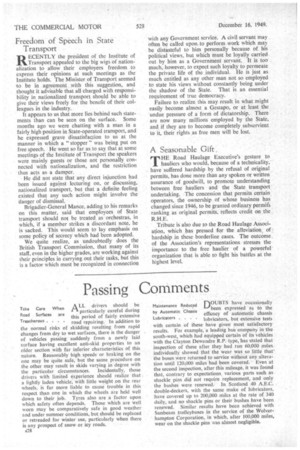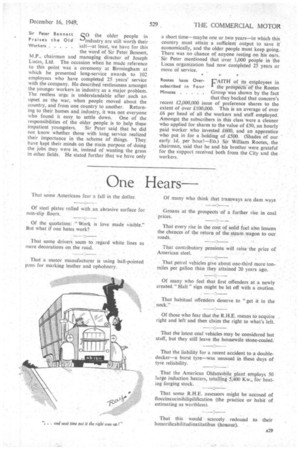Passing Comments
Page 30

Page 31

If you've noticed an error in this article please click here to report it so we can fix it.
A LL drivers should be 1-1 particularly careful during this period of fairly extensive " road repairing. In addition to the normal risks of skidding resulting from rapid changes from dry to wet surfaces, there is the danger of vehicles passing suddenly from a newly laid surface having excellent anti-skid properties to an older section with far inferior characteristics of this nature. Reasonably high speeds or braking on the one may be quite safe, but the same procedure on the other may result in skids varying in degree with the particular circumstances. Incidentally, those drivers with limited experience should realize that a lightly laden vehicle, with little weight on the rear wheels, is far more liable to cause trouble in this respect than one in which the wheels ire held well down to their job. Tyres also are a factor upon which safety often depends. Those which are well worn may be comparatively safe in good weather and under summer conditions, but should be replaced or retreaded for winter use, particularly when there is any prospect of snow or icy roads.
/08
Take Care When Road Surfaces are Treacherous .
DOUBTS have occasionally
been expressed as to the efficacy of automatic chassis lubricators, but extensive tests with certain of these have given most satisfactory results. For example, a leading bus company in the south-west, which had equipped certain of its vehicles with the Clayton Dewandre R.P. type, has stated that inspection of these after they had run 60,000 miles. individually individually showed that the wear was so little that' the buses were returned to service without any alteration until 120,000 mileshad been covered. Even at the second inspection, after this mileage, it was found that, contrary to expectations, various parts such as shackle pins did not require replacement, and only the bushes were renewed.. In Scotland 40 A.E.C. . double-deckers, with the same make of lubricators, have covered up to 200,000 inks at the rate of 340 daily, and no shackle pins or their bushes have been renewed. Similar results have been achieved with Sunbeam trolleybuses in the service of the Wolverhampton Corporation, in which, after 100,000 miles, wear on the shackle pins was almost negligible.
Maintenance Reduced by Automatic Chassis Lubricators . . .
Sir Peter Bennett qo the older people in Praises the Old *-1industry are still worth their Workers salt—at least, we have for this
the word of Sir Peter Bennett, M.P., chairman and managing director of Joseph Lucas, Ltd. The occasion when be made reference to this point was a ceremony at Birmingham at which he presented long-service awards to 102 employees who have completed 25_ years' service with the company. He described restlessness amongst the younger workers in industry as a major problem. The restless urge is understandable after such an upset as" the war, when people moved about the country, and from one country to another. Returning to their homes and industry, it was not everyone who found it easy, to settle down. One of the responsibilities of the older people is to help these impatient youngsters. Sir Peter said that he did not know whether those with long service realized their importance in the scheme of things. They have kept their-minds on the main purpoSe of doing the jobs they were in, instead of wanting the grass in other fields. He stated further that we have only a short time—maybe one or two years—in which this country must attain a sufficient output to save it economically, and the older people must keep going. There was no chance of anyone resting on his oars. Sir Peter mentioned that over 1,000 people in the Lucas organization had now completed 25 years or more of service. ,
Rootes Issue OverFAITH of its eniployees in subscribed in Four A the prospects' of the Rootes Minutes Group was shown by the fact that they backed that concern's recent £2,000,000 issue of preference shares to the extent of Over £100,000. This is an average of over £6 per head of all the workers and staff employed. Amongst the subscribers in this class were a cleaner who applied for shares to the value of £50, an hourly paid worker who invested £600, and an apprentice who put in for a holding of £500. (Shades of our earlyid. per hour!—ED.) Sir William Rootes, the chairman, said that he and his brother were grateful for the support received both from the City and the workers.




























































































